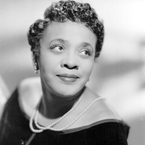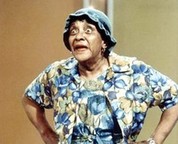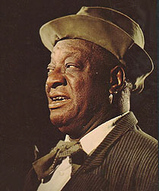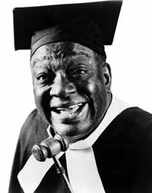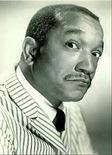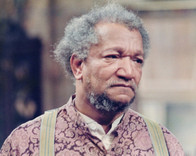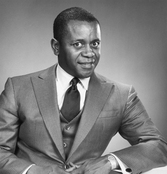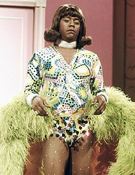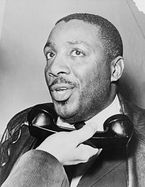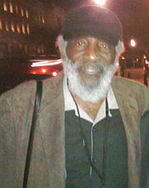Comedy and Social Activism - Part One: The Early Years

Comedians are the ambassadors of laughter and laughter warms the soul. Comedians have the unique ability to hold a mirror to society to let us see the naked truth. Unlike music, where an artist can make a statement without personal confrontation, comedians are on the front line. They have the confidence and perseverance to stand in front of a crowd night after night, sometimes sharing the most intimate details about themselves. This is pure power. Moms Mabley, Pigmeat Markham (the first rapper), Redd Foxx, Flip Wilson, and Dick Gregory each blessed with the gift of humor, were instrumental in raising social issues. Even to this day, Dick Gregory is holding the banner of social activism high. There are many more that have blazed the trail, far more that can be mentioned here.
Please click the link below to view a few video clips of these amazing performers. We have included video interviews where possible.
ENJOY!
Please click the link below to view a few video clips of these amazing performers. We have included video interviews where possible.
ENJOY!
All of the biographies below are excerpts from the African American Registry. It's worth the while to visit this webste
Moms Mabley
"She was an African-American vaudeville performer and comedian, the first African-American woman to establish herself as a single act in standup comedy.
Jackie "Moms" Mabley was from Brevard, North Carolina. She rose to national recognition as a standup comedian in the early 1960s. A pioneer of social satire, she has strongly influenced such contemporary Black comedians as Richard Pryor and Whoopi Goldberg. Mabley was also known for her compassion and kindness; these qualities earned her the endearing sobriquet "Moms". Born Loretta Mary Aiken, Mabley grew up in a large family in the south. Her father ran several businesses while her mother presided over a large household that included boarders.
When Loretta was 11 her father died when his fire truck overturned and exploded. Encouraged by her grandmother to make a life for herself, she departed for Cleveland, Ohio. After singing and dancing in local shows, she began performing throughout the country. Traveling the vaudeville circuit, she experienced overt racism and demeaning working conditions and deflected her pain through satirical wit that drew heavily from black folk traditions. Mabley’s career took off when, in 1921, the husband-wife vaudeville team, Butterbeans and Susie, invited her to perform with them in Pittsburgh, Pennsylvania."
Jackie "Moms" Mabley was from Brevard, North Carolina. She rose to national recognition as a standup comedian in the early 1960s. A pioneer of social satire, she has strongly influenced such contemporary Black comedians as Richard Pryor and Whoopi Goldberg. Mabley was also known for her compassion and kindness; these qualities earned her the endearing sobriquet "Moms". Born Loretta Mary Aiken, Mabley grew up in a large family in the south. Her father ran several businesses while her mother presided over a large household that included boarders.
When Loretta was 11 her father died when his fire truck overturned and exploded. Encouraged by her grandmother to make a life for herself, she departed for Cleveland, Ohio. After singing and dancing in local shows, she began performing throughout the country. Traveling the vaudeville circuit, she experienced overt racism and demeaning working conditions and deflected her pain through satirical wit that drew heavily from black folk traditions. Mabley’s career took off when, in 1921, the husband-wife vaudeville team, Butterbeans and Susie, invited her to perform with them in Pittsburgh, Pennsylvania."
Dewey "Pigmeat" Markham
"From Durham, North Carolina, Dewey Pigmeat Markham began his long career in 1917, dancing in traveling shows. He traveled the southern 'race' circuit with blues singer Bessie Smith and later appeared on burlesque bills with Milton Berle, Red Buttons, and Eddie Cantor. By the 50s, Markham was one of Black America's most popular entertainers through his shows at the Regal in Chicago, the Howard in Washington, and in particular, New York's famed Apollo.
Despite being Black, he applied burnt cork make-up to his face, a device that caused many of his fans to believe he was actually white. He later made several successful appearances on the influential Ed Sullivan television show and was signed by Chess during the 60s. The Chicago-based label issued several in-concert albums and his 1968 novelty hit, 'Here Comes The Judge'. This tongue-in-cheek recording was inspired by the artist's catch phrase, which was used extensively on the American television comedy series Rowan And Martin's Laugh-In."
Despite being Black, he applied burnt cork make-up to his face, a device that caused many of his fans to believe he was actually white. He later made several successful appearances on the influential Ed Sullivan television show and was signed by Chess during the 60s. The Chicago-based label issued several in-concert albums and his 1968 novelty hit, 'Here Comes The Judge'. This tongue-in-cheek recording was inspired by the artist's catch phrase, which was used extensively on the American television comedy series Rowan And Martin's Laugh-In."
Redd Foxx
"Born in St. Louis, John Elroy Sanford (his birth name) was the son of Fred and Mary, an electrician and minister respectively. His father deserted the family when he was four and his grandmother and mother in Chicago raised him. Foxx quit high school after one year to play in a washtub band with two friends, Lamont Ousley and Steve Trimel; they eventually ran away to New York in 1939.
When World War II broke out and their band broke up, Foxx was rejected by the military. He then played in a tramp band act at the Apollo Theater with Jimmie Lunceford. About this time he adopted his professional name “Red” because of his red hair and light completion, adding an extra “d” and taking the name “Foxx” with the label “foxy” (and the baseball player Jimmie Foxx) in mind. He began landing nightclub jobs where he developed a classic stand-up routine. From 1947 to 1951, he teamed up with comedian Slappy White, then worked the West Coast as a solo act. In 1956, he recorded the first of what would become more than 50 “party record”-comedy albums specializing in raunchy humor.
Although he had never done any straight acting, Foxx accepted the small role of Uncle Bud in the 1969 film "Cotton Comes to Harlem." NBC developed Sanford and Son, casting Foxx in the lead role, which ran from 1972 to 1977."
When World War II broke out and their band broke up, Foxx was rejected by the military. He then played in a tramp band act at the Apollo Theater with Jimmie Lunceford. About this time he adopted his professional name “Red” because of his red hair and light completion, adding an extra “d” and taking the name “Foxx” with the label “foxy” (and the baseball player Jimmie Foxx) in mind. He began landing nightclub jobs where he developed a classic stand-up routine. From 1947 to 1951, he teamed up with comedian Slappy White, then worked the West Coast as a solo act. In 1956, he recorded the first of what would become more than 50 “party record”-comedy albums specializing in raunchy humor.
Although he had never done any straight acting, Foxx accepted the small role of Uncle Bud in the 1969 film "Cotton Comes to Harlem." NBC developed Sanford and Son, casting Foxx in the lead role, which ran from 1972 to 1977."
Flip Wilson
"He was the most visible Black comedian of the early 1970s.
He was born in Jersey City, N.J., the tenth of 24 children. Clerow Wilson (his given name) was a troublesome and troubled child in his youth. His family was extremely poor, he ran away from several reform schools, and was ultimately raised in foster homes. His comedic talents first surfaced while he was serving in the Air Force overseas. While in the Pacific, Wilson entertained his buddies with preposterous routines. Upon his return to civilian life he had to settle for a day job as a bellhop along with part-time showmanship.
Opportunity found him in 1959 when a Miami businessman sponsored him for one year for $50 per week, enabling him to concentrate on the work he loved. For the next five years,Flip Wilson appeared regularly at the Apollo Theater in Harlem. The Tonight Show was his next stop. in 1965, he began a series of nationwide appearances, followed by long-term contracts and a number of hit records. With "The Flip Wilson Show" in the early 1970s, he became the first Black American to have a weekly prime-time television show under his own name.
In 1970, on the nation's TV screens, Flip Wilson put on a wig and a minidress and became Geraldine, who screeched: "What you see is what you get!" The man who gave the world Geraldine and the catch phrase, "The devil made me do it!" crossed all lines with his comedy, said the Rev. Jesse Jackson, who had known the comedian since the 1970s. "Flip was a breakthrough artist for African-Americans,'' Jackson said. "He led with a brand of comedy that was clean and decent and not vulgar."
He was born in Jersey City, N.J., the tenth of 24 children. Clerow Wilson (his given name) was a troublesome and troubled child in his youth. His family was extremely poor, he ran away from several reform schools, and was ultimately raised in foster homes. His comedic talents first surfaced while he was serving in the Air Force overseas. While in the Pacific, Wilson entertained his buddies with preposterous routines. Upon his return to civilian life he had to settle for a day job as a bellhop along with part-time showmanship.
Opportunity found him in 1959 when a Miami businessman sponsored him for one year for $50 per week, enabling him to concentrate on the work he loved. For the next five years,Flip Wilson appeared regularly at the Apollo Theater in Harlem. The Tonight Show was his next stop. in 1965, he began a series of nationwide appearances, followed by long-term contracts and a number of hit records. With "The Flip Wilson Show" in the early 1970s, he became the first Black American to have a weekly prime-time television show under his own name.
In 1970, on the nation's TV screens, Flip Wilson put on a wig and a minidress and became Geraldine, who screeched: "What you see is what you get!" The man who gave the world Geraldine and the catch phrase, "The devil made me do it!" crossed all lines with his comedy, said the Rev. Jesse Jackson, who had known the comedian since the 1970s. "Flip was a breakthrough artist for African-Americans,'' Jackson said. "He led with a brand of comedy that was clean and decent and not vulgar."
Dick Gregory
"Richard Claxton Gregory was born in St. Louis. Reared in poverty, he began working at an early age to help support his family. He was involved in sports and social causes in high school, and he entered Southern Illinois University on an athletic scholarship in 1951, standing out as a middle-distance runner. He was named the university's outstanding student athlete in 1953, the same year he left college to join the U.S. Army, where he hosted and performed comedy routines in military shows. Gregory began his professional career in 1958 as a master of ceremonies at several Chicago nightclubs.
He achieved national recognition following his debut at the Playboy Club in Chicago in 1961. The one-nighter turned into a six-week stint that earned him a profile in Time magazine and a television appearance on the Tonight Show hosted by Jack Paar. In his numerous succeeding television, nightclub, and concert routines, he targeted poverty, segregation, and racial discrimination. He gained fame as a comedian for his satirical views on American racial attitudes.
Active in the civil rights movement, he came to Selma, Alabama and spoke for two hours on a public platform two days before the voter registration drive known as "Freedom Day" (October 7, 1963)
Gregory began his political career by running for mayor of Chicago in 1967 against Richard J. Daley. Gregory ran for President of the United States in 1968 as a write-in candidate of the Freedom and Peace Party.
Gregory wrote several books of racial humor; the first was "From the Back of the Bus" (1962). Gregory shocked the country by titling his second book, an autobiography, "NIGGER!" (1964). He described his humble beginnings, and the racism he experienced at Southern Illinois University in the 1950s.
Gregory was arrested for Civil Disorder during a 1963 civil rights demonstration in Birmingham. He was also an outspoken critic of American involvement in the Vietnam War. In 1968, he believed that the Federal Bureau of Investigation played a role in the assassination of civil rights leader Martin Luther King, Jr. Gregory study with Mark Lane resulted in his book "Code Name Zorro" (1978). A congressional investigation disagreed with his theory. He became a candidate for president in 1968 as a write-in, which he wrote about in "Write Me In" (1968). There was also "No More Lies: The Myth and the Reality of American History" (1971).
In the early 1970s Gregory abandoned comedy to focus on his political interests, which widened from race relations to violence, world hunger, capital punishment, drug abuse, and poor health care. He generated particular attention for his more than a hundred hunger fasts. It was at this time that he became a vegetarian, a marathon runner, and an expert on nutrition. In the 1980s, he began a successful business venture with his nutritional product, the "Bahamian Diet," around which he built Dick Gregory Health Enterprises, Inc. Through his company, he targeted the lower life expectancy of Black Americans, which he attributed to poor nutrition and drug and alcohol abuse.
Now, Gregory is fighting cancer. Southern Illinois University inducted him into its Athletic Hall of Fame recently. Then there was a tribute to Gregory in the nation's capital on October 9, at the Kennedy Center, hosted by the National Council of Negro Women.
At a Civil Rights rally marking the 40th anniversary of the Voting Rights Act, Gregory called the United States, "the most dishonest, ungodly, nonspirituals nation that ever existed in the history of the planet. As we talk now, America is 5 percent of the world's population and consumes 96 percent of the world's hard drugs."
He achieved national recognition following his debut at the Playboy Club in Chicago in 1961. The one-nighter turned into a six-week stint that earned him a profile in Time magazine and a television appearance on the Tonight Show hosted by Jack Paar. In his numerous succeeding television, nightclub, and concert routines, he targeted poverty, segregation, and racial discrimination. He gained fame as a comedian for his satirical views on American racial attitudes.
Active in the civil rights movement, he came to Selma, Alabama and spoke for two hours on a public platform two days before the voter registration drive known as "Freedom Day" (October 7, 1963)
Gregory began his political career by running for mayor of Chicago in 1967 against Richard J. Daley. Gregory ran for President of the United States in 1968 as a write-in candidate of the Freedom and Peace Party.
Gregory wrote several books of racial humor; the first was "From the Back of the Bus" (1962). Gregory shocked the country by titling his second book, an autobiography, "NIGGER!" (1964). He described his humble beginnings, and the racism he experienced at Southern Illinois University in the 1950s.
Gregory was arrested for Civil Disorder during a 1963 civil rights demonstration in Birmingham. He was also an outspoken critic of American involvement in the Vietnam War. In 1968, he believed that the Federal Bureau of Investigation played a role in the assassination of civil rights leader Martin Luther King, Jr. Gregory study with Mark Lane resulted in his book "Code Name Zorro" (1978). A congressional investigation disagreed with his theory. He became a candidate for president in 1968 as a write-in, which he wrote about in "Write Me In" (1968). There was also "No More Lies: The Myth and the Reality of American History" (1971).
In the early 1970s Gregory abandoned comedy to focus on his political interests, which widened from race relations to violence, world hunger, capital punishment, drug abuse, and poor health care. He generated particular attention for his more than a hundred hunger fasts. It was at this time that he became a vegetarian, a marathon runner, and an expert on nutrition. In the 1980s, he began a successful business venture with his nutritional product, the "Bahamian Diet," around which he built Dick Gregory Health Enterprises, Inc. Through his company, he targeted the lower life expectancy of Black Americans, which he attributed to poor nutrition and drug and alcohol abuse.
Now, Gregory is fighting cancer. Southern Illinois University inducted him into its Athletic Hall of Fame recently. Then there was a tribute to Gregory in the nation's capital on October 9, at the Kennedy Center, hosted by the National Council of Negro Women.
At a Civil Rights rally marking the 40th anniversary of the Voting Rights Act, Gregory called the United States, "the most dishonest, ungodly, nonspirituals nation that ever existed in the history of the planet. As we talk now, America is 5 percent of the world's population and consumes 96 percent of the world's hard drugs."
|
|

